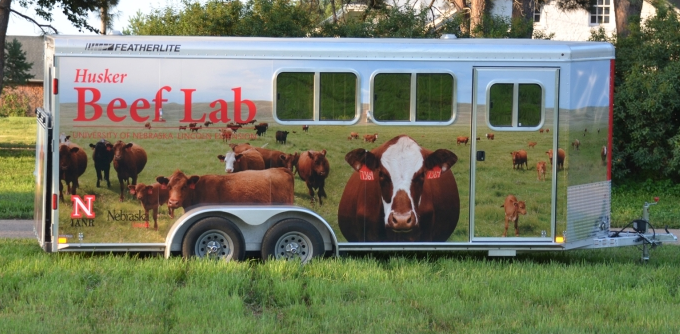
UNL Extension will be taking science on the road, teaching concepts of biology using rumen-fistulated animals, with its Mobile Beef Labs.
"Experiencing the lab will teach students science principles by learning about the ruminant animal — its complexities and what makes the ruminant unique in the environment and ecosystem," said Brent Plugge, UNL extension educator in Buffalo County. "The overarching goal is to teach Nebraskans the value of animal agriculture, creating support for the beef industry and the high quality protein it provides."
UNL has a history of youth science field days for school children, Plugge said.
"So we got to thinking, instead of youth coming to us, we could put together a mobile lab that would give more flexibility by going to the youth across the state," he said.
The two 19-foot aluminum trailers are mobile teaching laboratories for one rumen-fistulated animal and lab components, such as a microscope, TV and computer.
One of the UNL Mobile Beef Labs will be at the Nebraska State Fair in Grand Island Aug. 26-Sept. 5.
Students and others can go in the trailer to learn about science, specifically biology, around the rumen-fistulated animal, Plugge said.
"That science can then be taken to the lab side of things to look at microorganisms under a microscope, for example," he said.
The Mobile Beef Labs will be housed at the West Central Research Extension Center at North Platte and at the Agricultural Research and Development Center near Mead. However, the labs will make visits to schools and programs that need this science curriculum. Plugge expects to visit biology classes, FFA chapters, youth science field days and ag awareness days.
"The Mobile Beef Lab's mission is not only science, but also to teach the importance of animal agriculture to our state," Plugge said. "We have a team of educators familiar with curriculum that can go out and use the lab and the animals to conduct our programming."
The team has developed curriculum that includes rumen anatomy and physiology, symbiotic relationships — how the animal and microorganisms rely on each other for survivability, rumen pH and buffering mechanisms, the role of microorganisms in digestion, plant growth and physiology, Nebraska livestock and why they are important to Nebraska landscapes and the importance of animals as a protein source for human nutrition.
For more information about the Mobile Beef Lab contact Plugge at bplugge1@unl.edu or (308) 236-1235; or at the ARDC, Bob Meduna or Sara Ellicott at (402) 624-8000, rmeduna1@unl.edu or sellicott2@unl.edu.
- Sandi Alswager Karstens, IANR News Service